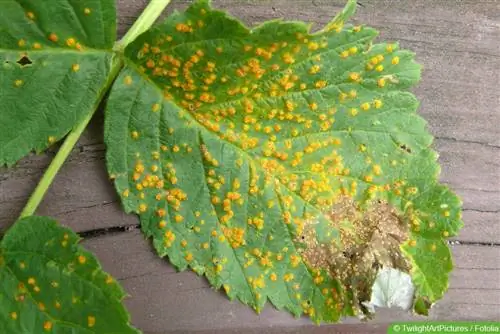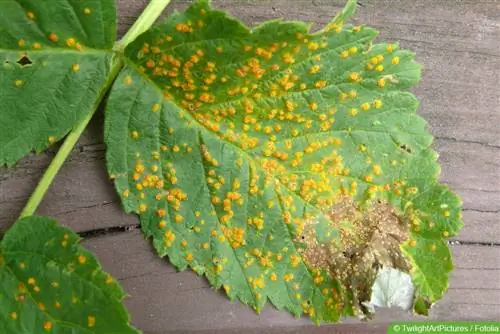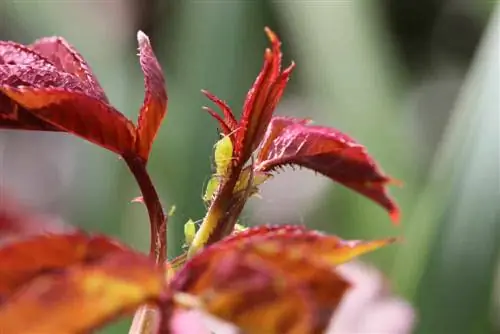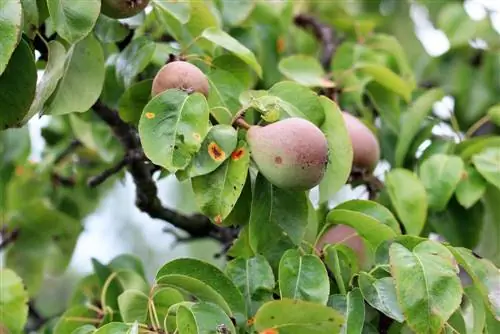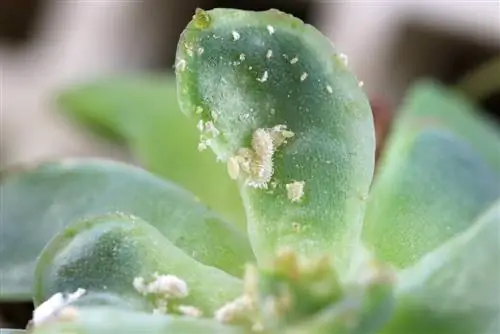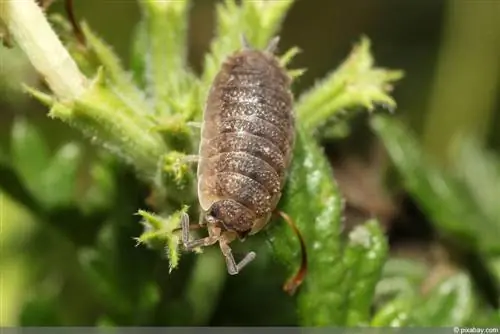- Author admin [email protected].
- Public 2023-12-17 03:39.
- Last modified 2025-01-24 12:45.
The seductive splendor of roses in your own garden is quickly lost when the plants are attacked by so-called rose rust. This is a fungal disease that can affect roses in more than just their appearance. If you notice an infestation, you should act quickly. However, prevention is better than fighting it. And it can help to plant only certain roses.
Recognize
The so-called rose disease in Central Europe is caused primarily by two fungi, Phragmidium mucronatum and Phragmidium tuberculatum. They can penetrate into the molecular structure of the leaves in particular and then inevitably lead to optical changes on the top and bottom of the leaf. These changes are relatively easy to recognize. There are usually small yellow-red spots on the upper side of the leaf, while at the same time yellow-orange pustules the size of a pinhead can be seen on the underside of the leaf. If both characteristics occur together, then rose disease is clearly present. To recognize it, it is always necessary to look at the leaves from both sides. In certain circumstances, a magnifying glass can be very helpful.
Tip:
Roses and especially their leaves should, if possible, be checked several times a week for unnatural changes. Of course, this check can also only be carried out randomly.
Consequences of an infestation
Rose rust is one of the most common diseases of roses, but it is also relatively harmless to the plant. Most of the time it only leads to visual impairments on the leaves. However, since the appearance of roses plays a major role, this fungal attack can quickly spoil your enjoyment of the plant. If there is a particularly severe infestation, complete loss of leaves can sometimes occur. However, such severe fungal infestation only occurs extremely rarely. However, if it is not de alt with immediately, it can have dramatic consequences for the rose bush, including death.
Fighting rose disease
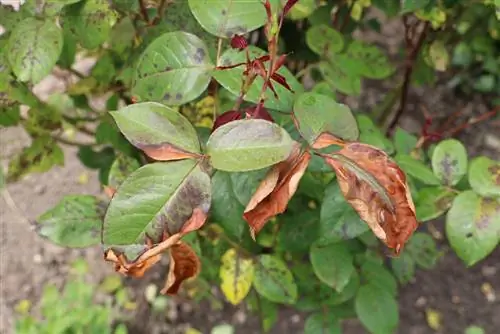
A fungal infestation on the rose bush can be treated with specially developed products from specialist retailers. These agents can be both chemical and biological. However, going to the specialist store is not necessary. Rose disease can be de alt with at least as well with home remedies that practically everyone has easy access to. They also cost less and are usually much more environmentally friendly. Only if there is a very severe infestation will you no longer be able to avoid using chemical substances. In the vast majority of cases, however, experience shows that it works without it. Incidentally, the fight is always based on destroying the fungus that has infected the plant.
Organic home remedies
Rose rust can be combated excellently and very effectively with organic home remedies. Three remedies in particular have been recommended, which can be mixed relatively quickly and are very easy to use.
1. Cooking oil/dishwashing liquid mixture
- Mix 100 milliliters of cooking oil with two packets of baking powder and a few drops of dishwashing liquid
- pour three liters of warm, but not boiling, water
- Stir the mixture well with a clean wooden spoon and let it cool down further
- Pour parts of it into a spray bottle and spray the entire plant with it
- Don’t forget the undersides of leaves and branches
2. Field horsetail manure
- Fill one kilogram of fresh field horsetail leaves with ten liters of cold to lukewarm water
- Let the mixture steep for at least 24, preferably 48 hours
- then filter with a linen cloth or a fine sieve
- then dilute to about ten percent with clear water
- use the diluted manure as irrigation water
- water and spray the affected plant at least every two weeks
3. Garlic broth
- Finely chop 300 grams of garlic
- pour ten liters of boiling water over it
- Let the mixture steep for around half an hour
- then filter with a clean linen cloth or a fine sieve
- let the infusion cool down further
- then spray the plant with the mixture every two weeks
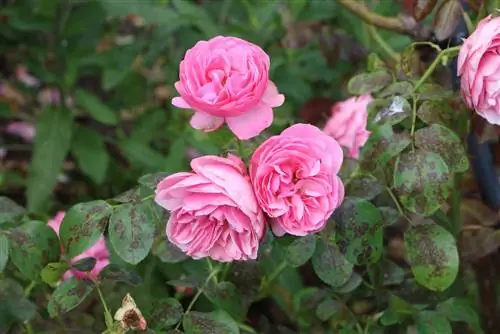
The horsetail manure is also suitable for preventive use. If you water the roses regularly, the likelihood of a fungus nesting in the plants is reduced. As a result, rose rust does not occur. The manure can also be an important protection against other diseases. It provides excellent protection, especially against the dreaded mildew.
Tip:
Regardless of which remedy you choose, infected leaves should always be removed and disposed of in the trash. Under no circumstances should fallen leaves be left under or near the plant.
Prevention
As we all know, the best disease is the one you don't get in the first place. This applies to us humans, but also to animals and plants. Prevention is therefore always better than cure. There are a number of measures to protect roses in the garden from rose disease. Here are the most important ones:
Only plant roses with the ADR seal
Roses that have an ADR seal are generally significantly less susceptible to diseases. ADR stands for “General German Rose Novelty Test”. These are particularly resistant and very robust breeds. It is therefore advisable to only plant roses that can bear this seal. This does not mean a 100% guarantee and does not mean that they are resistant to fungal infection, but the likelihood of this occurring to them is many times lower.
Ensure good ventilation
In order for a fungus to spread in a rose bush, it needs a rather humid and warm climate. It therefore makes sense to plant the rose bushes so that they are always well ventilated. So they shouldn't be too close together either. The wind will then ensure that wet leaves dry again very quickly.
Watering only in the root area
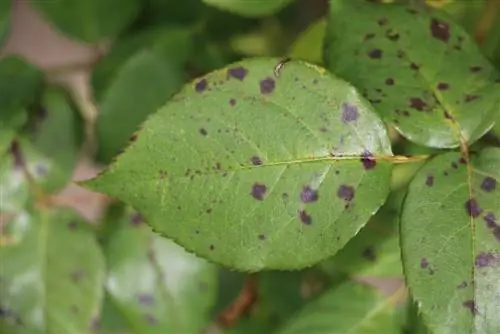
Water drops on the leaves promote fungal infestation. If the roses are watered, watering should always take place directly in the root area. Watering from above is therefore generally prohibited. However, sometimes it cannot be avoided. If this is the case, be sure to water in the morning so that the leaves can dry well again during the day.
Planting garlic and fertilizing it properly
Knoblich doesn't just work wonders for us humans. It can also protect roses from fungal attack. Certain substances it contains act as a type of natural fungicide. Garlic plants between rose bushes may not look great, but they can provide effective protection. Ultimately, correct fertilization is also an important preventive measure against rose rust. The following applies: Always only supply a small amount of nitrogen.

